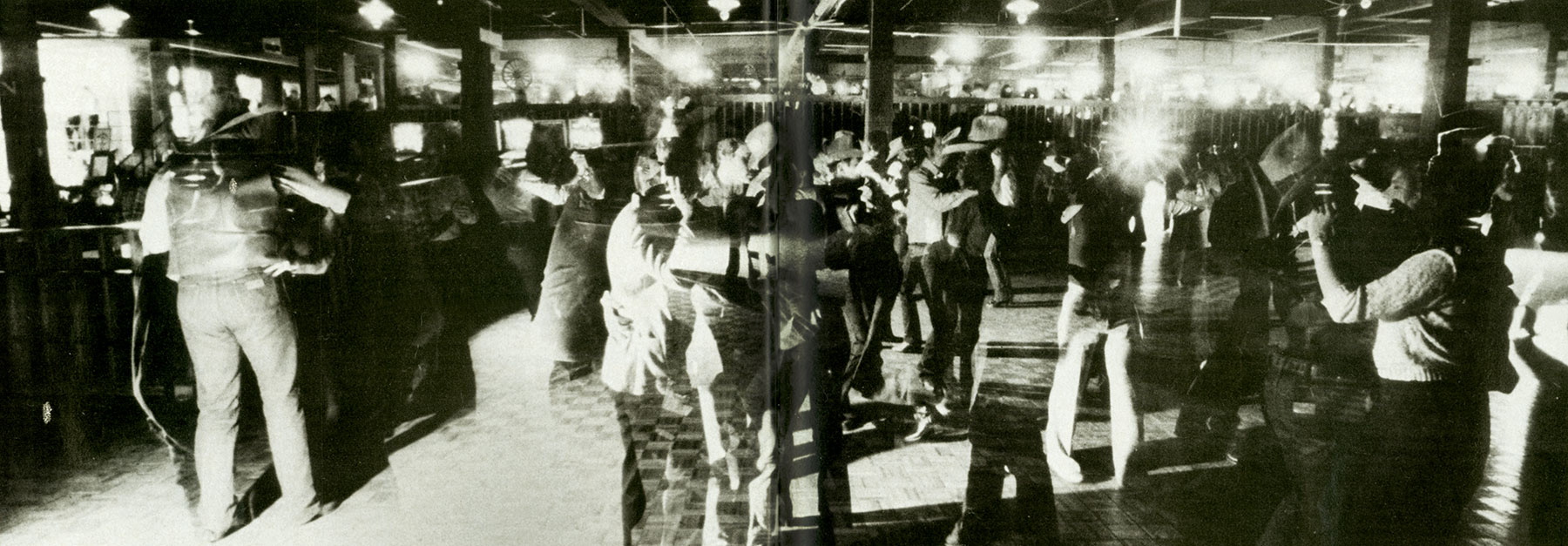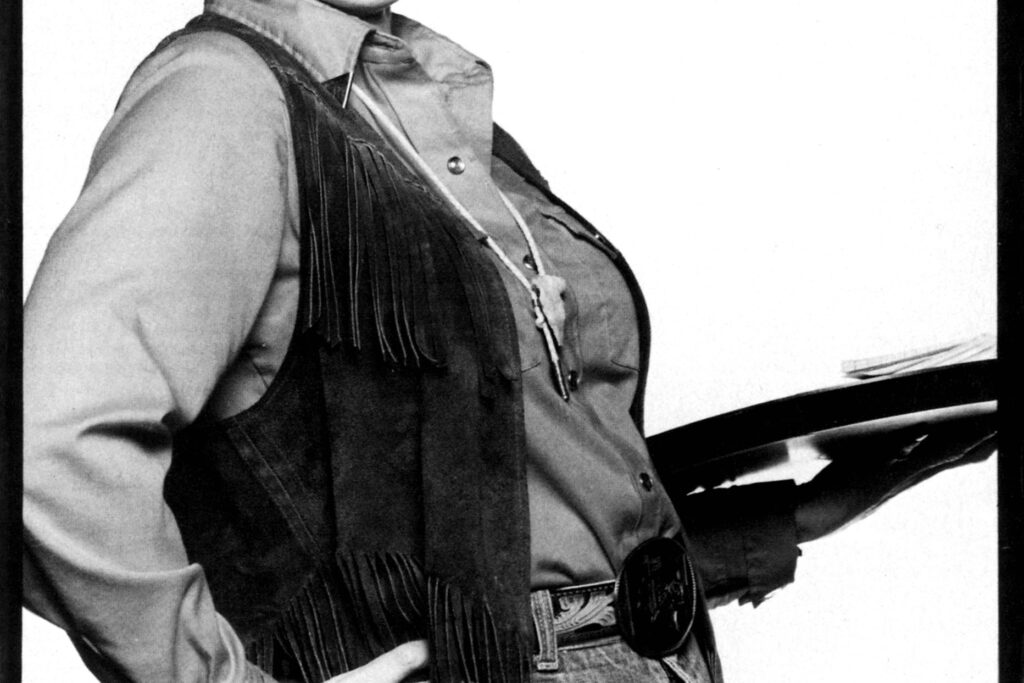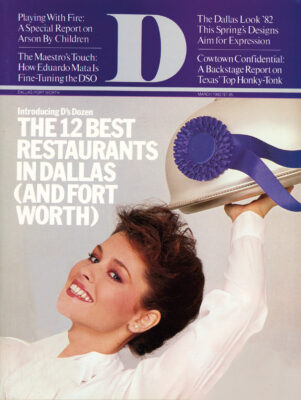The managers never seemed to have much respect for waitresses as a breed, but then, a lot of the cocktail waitresses didn’t have an inordinate amount of respect for themselves. The owners — Billy Bob Barnett and Spencer Taylor — didn’t have much contact with waitresses outside the VIP Room, but I suspect they perceive waitresses as a homogenous mass.
All the men working at Billy Bob’s made a big deal about how busy they were. My feelings for Don Howard, our manager, kept changing; it’s hard to dislike anyone who always calls you “dear.” There were so many waitresses on his staff who perpetually disappointed him with poor attendance and feeble excuses for having missed work (“My husband wouldn’t let me come,” “My sister came into town,” “My car broke”) that it really took very little to please him. Before long, he was placing me right beside the stage, and more experienced waitresses were jealously introducing themselves and asking my name. By that time I had purchased earrings the size of elaborate fish lures to compensate for the shortness of my hair. I had also learned to wear a leotard under my Western shirt, which I kept open to the waist, and I was tying a $3 bandana tightly about my neck. I’d abandoned the construction boots. I could afford to be relaxed and pleasant with Howard; I didn’t need the money I was making.
Sometimes, Howard would tell us how satisfactory we were as a group; other times he would vent his frustrations on us. There were waitress meetings every Saturday night in the bull arena after closing. Once, balanced on the top rail of the ring with his boots hooked over the second rung, Howard bawled us out from under his black hat.
“You know, I don’t ask much of you girls, and I’m getting real tired of you always letting me down. Last Sunday, after I’d given ya’ll that big talk about coming in when you were scheduled, only five waitresses showed up for work. That’s right, only five. And then that makes me look real bad in front of everybody else, and they start askin’ me, ’What’s the problem with the waitresses?’ I don’t know what to say to ya’ll except that maybe a lot of you don’t know what it’s like to work at most of the clubs in town where the managers want to sleep with you before you can get anywhere. That’s the way it works most places, and we don’t do that to ya’ll here, see. But maybe you don’t know what it’s like everywhere else.”
After this particular tirade, I was among the last waitresses out of the arena, just behind a waitress and her security-guard husband who’d been standing beneath the bleachers waiting, probably where Howard couldn’t see.
“No way you’re going to take that from him,” the guard said, pulling his wife closer to him by the edge of her jacket. “No one talks to my wife that way.”
“Aww, honey,” she said. “Don was just pissed.”
• • •

There’s something about working in a bar that establishes you almost immediately in a brotherhood, or in this case, sisterhood. In the dimness of the bar light, the edges of things blur, and you begin to feel as though you can grasp the essence of someone’s being within a few conversations, sometimes in just a few words. There’s a flatness to everything. And people come and go so fast, there’s never any time.
One night, I was standing in the waitress station waiting for my section to fill up and drinking ginger ale on the house when another waitress I knew only by sight came up to the bar and just stood there. Our eyes met for a moment, then we fell back into our respective reveries. Out of the corner of my eye I saw her look at her watch and twist it straight on her wrist. Then she stood very still. I turned around so that my back was resting on the bar and so I could face the interior of the club. I took a sip of ginger ale and a bite of an ice cube, then inclined my head to the right, raised my eyebrows and exhaled as if to say, Well, here we are; this is dull. She continued to face the bar, which I figured was her way of expressing closure. If she’d turned around to face the club, I would have known she wanted to talk. Finally, after what seemed like an interminable period, she made one remark, and she said it as if it were just a statement of fact.
“I’m lonely,” is what she said.
I shifted my weight and looked at her. She was looking right at me, but her eyes were saying, “Don’t say anything. It’s no big deal. It’s just true.”
• • •
Every now and then, and with greater frequency as the weeks went on, I’d get a little antsy, a little nervous about my role, and I’d tell myself I’m only here to absorb it. Take it all in.
But I really couldn’t help but get involved. I really couldn’t help but hurt. It surprised me every time I found myself listening to a waitress’ life story just as some song with a mournful pedal steel that paraphrased what she’d been telling me flowed through the speakers above our heads.
And I could see them in different stages — as if all the waitresses were tadpoles, but some had tails and others had feet.
Among the youngest was Frannie, who was married to a Billy Bob’s bartender. I caught them kissing once in an empty waitress station. They parted, and he swaggered back behind the bar to make my drinks.
“Baby,” she said as she rested her weight on the front of the bar, “if we make a lot of money tonight, can I put that jacket on layaway?”
He didn’t answer.
A week later, I saw her in the ladies’ room. We didn’t speak directly to each other; we spoke into the mirror.
“I sure wish I could go home,” she said. “I feel sick.” She spread her hands out over her stomach and made a diamond-shaped configuration with her forefingers and thumbs.
“Pregnant sick?”
“Maybe,” she said.
“Is that good?”
“Well, we talked about it quite a while ago, and he said he didn’t want one. Then the next day he told me that he’d thought about it, and he’d changed his mind.”
I asked her if they had enough money to have a baby. She exhaled a huffy little laugh and said no.
“What are you going to do?”
“You don’t need money to have a baby,” she said in an aren’t-you-a-silly-person voice. “You just need to want a baby. If we waited until we had a million dollars to have a baby, we’d never have one.” Then she gave me a sweet, half-confident smile.
This was not the only time I realized there were irreconcilable differences between me and the other girls. One night Connie, Tammy, and I ate in the Waffle House on the Jacksboro Highway. “I’ve never had a bad meal in a Waffle House,” Connie said, unfolding her napkin. She asked Tammy what her name was going to be when she married her fiance next year. Tammy told her and said, “I really kinda like my old name, to tell you the truth.”
I phased in. “Why not use your maiden name?”
Tammy’s eyes widened. “Oh, sure.”
“Oh yeah,” said Connie. “Some people do that. They keep their maiden names legally and everything. Career women do it. Women who have, you know, careers, do it. It’s very big down here.”
“Yeah, right,” Tammy said. “That would go over great with Tony. I can just see his face. He’d die.”
• • •
I never worried much about Tammy. She was headstrong and streetwise and about to get married to a man who didn’t look too bad. (“Hey, he is hairy,” said Connie when Tammy showed us his photograph.) Tammy never wore makeup and had skin like varnished oak.
It didn’t take Tammy long to get disillusioned with the $30-a-night she was making as a cocktail waitress. One afternoon she had a conversation with one of the Great American Shoeshine girls working near the VIP Room. “Those shoeshine girls make a fortune!” Tammy reported back to Connie and me. “Over $100 every night. We should all change over.” But Connie didn’t like the idea of stooping over somebody’s boots — that’s what she said; but what she probably realized was that she didn’t have the ooomph it takes to polish, wipe, and buff a man’s boots in the erotic manner those shoeshine girls do.
What people come to find at Billy Bob’s I never discovered.
Connie’s life was considerably more complicated than Tammy’s. Connie was 29, had two babies, and was married to a man in the building business who had a drinking problem and who didn’t want her to work. Her dream was to get back into a bluegrass band. Her husband had made her give up music.
“But now, see, I’m scheming,” she once said. “I never should have gone back to him the first time we split up. But I’ve figured it all out now, and I need to find a job that will pay me at least $7 an hour so I can take the kids and move out on my own.” She wanted to find a factory job, she said. She liked piecework.
Connie’s attendance record was fairly disgraceful because her husband often wouldn’t let her use the car. One Friday night she decided to “freak him out” by not going home at all and spending the night at a girlfriend’s. “That way, I’ll keep the car all day and be able to get to work Saturday night. He’s good with the kids, so they’ll be okay.”
Connie failed to appear on Friday of the following week. I saw her for the last time that Saturday, just as I was heading out of the back room. She waved from the far end of the hall and walked toward me. I remember thinking it was strange to see her wearing glasses. Then I saw her black eye.
“This is nothing. It was a black face. Now it’s just a black eye,” she said. She was smiling.
• • •
I’ve seen Billy Bob’s in the daylight only once, and that was on one unusually warm but overcast December afternoon after a meeting about how the club was going to deal with the Big Night, New Year’s. A waitress named Vanessa and I were walking through the parking lot toward our cars when she stopped rather abruptly and said, “Where do all those fences go over there?” She was looking right at the stockyards. Then we both noticed some people on the stockyard walkway, a bridge suspended about 30 feet in the air. “Neat! Let’s go up there.”
A few sets of stairs later, we were looking at the Fort Worth skyline on the left and the Billy Bob’s marquee on the far right. Below us there were, of course, lots of cows. As she walked the length of the overpass, periodically pushing the hair out of her eyes, Vanessa told me that she had an education degree from a college in Missouri and that what she really wanted to do was teach. I asked her why she was working at Billy Bob’s. She puffed out her cheeks then exhaled through her nose.
“Well, you know, I hardly feel like I’m really working here. I’ve applied for a substitute teaching job, but I don’t know if I’ll get it this late.
“Waitressing. I don’t know. I’ve waitressed before,” she said. “It’s just … it’s just something. You really don’t have to commit yourself to it. I mean, there are minimal demands, so it works while I’m trying to move out of my sister’s place and kind of establish myself.”
Then she said something like “It’s funny when you leave a waitressing job, especially in a big place like this because they all say ’Who was she?’”
I could barely hear her because she was talking with her head bent down.
“What?”
“‘Who was she?'” she said, lifting it up. “That’s what they’d say if I quit today. Don would say, ’Vanessa quit.’ Then somebody would say, ’Who was she?’”
• • •
During four and a half weeks I worked 13 nights at Billy Bob’s Texas, and in that period of time, about a quarter of the cocktail-waitressing staff quit. December is notorious for being the worst of all months for most restaurants and nightclubs, and some of the girls got frustrated with the paltry sums of money they were pulling in. Five waitresses out of 45 quit after the Roy Clark show, which was a success for the club, in terms of ticket sales, but a bust for the waitresses because so many of the old-timers drank soft drinks and didn’t tip. Two girls scratched out their names and wrote “I QUIT” directly on the posted schedule right after that.
What people come to find at Billy Bob’s I never discovered. It is too large for single people to successfully mingle in, and I’ve been told the “action” in Fort Worth is elsewhere. Obviously, the music was always a draw, and the country acts attracted families — Mom, Dad, an older son and his wife was not an unusual combination. More married couples in their 30s and 40s come to Billy Bob’s than any other group outside the tourists. They come in two varieties: happily married and not-so-happily married. The happy ones might get drunk and neck. The unhappy ones argued. It was sometimes entertaining but usually disturbing to be hailed by the husband and shooed away by the wife. That happened at least once a night, and it always posed a problem. Obey her and be thanked, or obey him and get tipped, usually quite generously.
Of course it’s safe to say that people flock to Billy Bob’s to have a good time. What constitutes the “goodness” or the “quality” of the “meaningfulness” of their fulfillment is another issue, but eventually I saw that everything connected, that there were distinct correlations between how well I was working, how happy customers were seeming, how attractive I was feeling, and how much money I’d made. A lot depended upon the enthusiasm of the musicians on stage.
When Billy Bob’s was really clicking — when customers and employees seemed to be cooperatively moving toward a common end — you could feel it as powerfully as you’d feel an electrical charge. It pulsated from the stage.
By 10 or 11, the bartenders could move as fluidly as the liquor they poured. They’d find an inner rhythm and vary it slightly to suit the nature of the song being sung on stage.
These were the times, the uplifting times at Billy Bob’s, that the waitresses were energized by little bursts of self-esteem. Suddenly they were vital parts of a beautiful gymnastic routine. Money was coming in. It was lyrical, perfect.
The service at Billy Bob’s was just that smooth on New Year’s Eve when some 4,000 patrons paid up to $250 apiece for drinks, a lousy breakfast, cheap sparkling Italian wine, and the best all-purpose entertainment lineup in the country that night. Bob Hope (who is said to have made $100,000 for three hours on stage), Johnny Cash, June Carter Cash, Tanya Tucker, Chuck Berry, Razzy Bailey, and the Fort Worth Symphony Orchestra.
One-third of the customers were servicemen in uniform who came on donated tickets. That lent a certain USO eerieness to the extravaganza.
At midnight, balloons were dropped, and all the celebrities got up on stage to sing “Auld Lang Syne.” I had a controllable group of likable customers tipping me $20 bills. They were potted by midnight, of course, as were the bartenders and many of the waitresses.
Soon everyone was singing a raucous rendition of “Roll Out the Barrel,” led by Tanya Tucker. Johnny Cash was standing next to Bob Hope, and both of them were singing and gazing affectionately at June Carter, who had enthusiastically hiked her beaded evening gown over her knees so she could wiggle and dance around.
All the servicemen sang. All their wives sang. All the wealthy-looking Texans in their handsome hats and horseshoe-shaped diamond rings clapped their fat hands together and sang. Everyone was singing, and there was very little else I could do but find a vacant chair to stand on and sing along, too.
Roll out the barrel
We’ll have a barrel of fun
Roll out the barrel
We’ve got the blues on the run
I stood there — engrossed — knowing I was enjoying what I heard and saw, but wondering what the hell I was supposed to be getting out of it. What did it mean? I was grasping for available stimuli, hoping something would be triggered. Nothing was coming up. Scratch. So I decided not to try. It was, after all, just another New Year’s, and I’d never seen anything quite like it before.
I hugged my tray and sang until someone pulled me by my belt loop. I’d forgotten who I was. I looked down. It was a man I’d never seen. He seemed irritated. He said, “Can you bring me two double shots of Crown?”
40Gr8
Author








